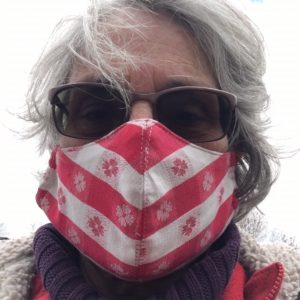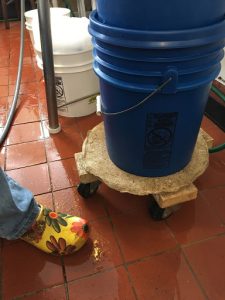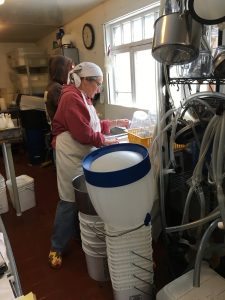Caitlin Hunter: Notes from an Experienced Cheesemaker
 In part 2 of my conversation with Caitlin, we talk about her work to establish a high standard for cheese producers in Maine. Caitlin started the Maine Cheese Guild and was its first president, serving from 2003-2007. She mentored dozens of apprentices over her 30 years of making cheese and is very proud that many of them went on to work in the cheese industry or started their own cheese businesses.
In part 2 of my conversation with Caitlin, we talk about her work to establish a high standard for cheese producers in Maine. Caitlin started the Maine Cheese Guild and was its first president, serving from 2003-2007. She mentored dozens of apprentices over her 30 years of making cheese and is very proud that many of them went on to work in the cheese industry or started their own cheese businesses.
You started the Maine Cheese Guild when cheesemaking was in its infancy in Maine. Can you talk about fostering expertise in cheesemaking and developing a consumer base in Maine?
MOFGA gave us a big boost in the early 2000s by recognizing the need for more cheese education and helped us form the Cheese Guild (Guild) in 2003. Maine is a very dairy-friendly state. We have sensible but easy rules as well as support from the Dept of Ag. and that helps small-scale producers get started.
Education is part of the Guild’s mission. The Guild has sponsored workshops, the food science folks at the University of Maine have provided technical assistance, and most recently Maine Farmland Trust has conducted business workshops. We have created resources and support for cheesemakers that exceed any other state (and little was available in the 90s when us old goats got started).
Do you think cheese making in Maine has a healthy future?
Absolutely! One of the things that makes Maine a great place to start a cheese business is that you can start on a very small scale. We built a cheese room on a shoestring budget. It took us almost four years and we’ve been playing catch-up ever since, just trying to stay ahead of repairs and things wearing out. But like anything, you can spend endless money on upgrades and the latest and greatest equipment.
Most of these young folks are NOT thinking about wear and tear on their bodies…. They still carry too many buckets around—bulk tank to cheese vat, whey to pigs, etc.
In AgrAbility we say, “Your body is your most valuable tool.” If you were advising a new cheesemaker on building a cheese processing facility, what would you suggest to prevent wear and tear on the body over time?
 Lift NOTHING!
Lift NOTHING!
- Use a pump for your milk and whey.
- Put everything you can on wheels, so it can be moved easily.
- Make sure your floors are smooth and your paths are wide enough.
- Use a cart to move things from one location to another.
- Plan the cheese cave close to your workspace.
- Plan the finished cheese fridge close to the packing and loading area.
- Have these work areas all on the same level—no stairs!
- If workstations are at different heights, you can work sitting or standing.
How does design change if two or more people will be working simultaneously?
I didn’t know what to expect when I started, and I worked alone for over 10 years. A square room is better than a long and narrow room. There’s more room to work so you’re not in each other’s way and more space to move products from place to place. A lot depends on what kind of cheese you are making. A giant vat takes up a lot more room than a couple of small vat pasteurizers.
You have a farm stand, too, don’t you?
We got a grant from the Dept of Ag to create the Appleton Cheese Trail (now the Midcoast Cheese Trail), so that paid for the farm stand, the display cooler, and signage. I wish we could make it handicap accessible, with a better path. At special events, we have brought goat kids up to a car so a handicapped person could pat them.
What other advice on infrastructure do you have for a new farmer who is thinking about raising animals, producing milk, and making value-added products?
- Build your barn and milk room next to the road.

- Build twice as big as you think you will ever need.
- Put in the heavy electric service.
- Design your label and brand before you start marketing.
- Have a business name that is easy to pronounce and sounds delicious.
- Plan a day off a week and stick to it.
- Plan a day a week to do book work and stick to it.
Cheesemakers and cheese connoisseurs around the state give you a collective, virtual hug and say, “Thank you for being a pioneer, a leader, and an inspiration.”
Thank you!
